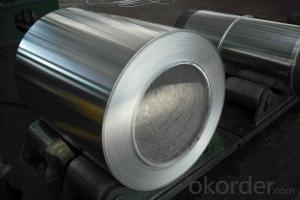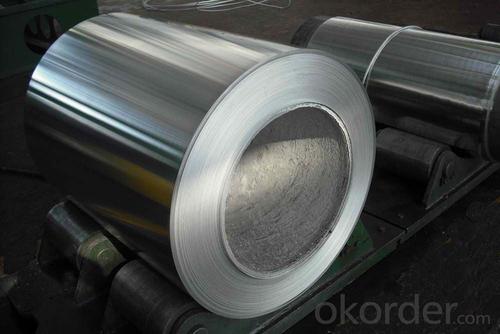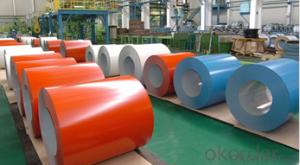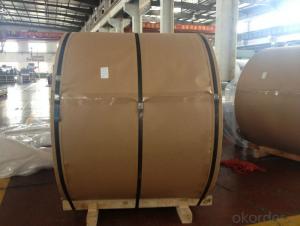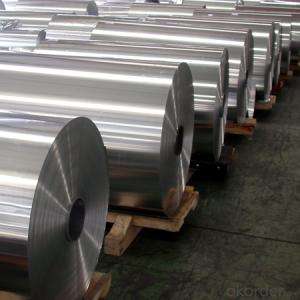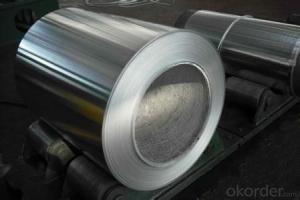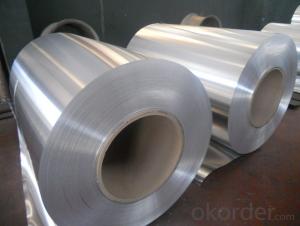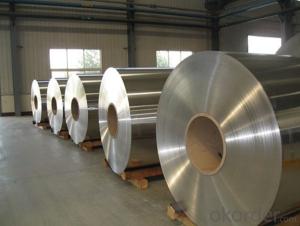Aluminum Coil 1100 Hot Roll Aluminium Strip
- Loading Port:
- China Main Port
- Payment Terms:
- TT OR LC
- Min Order Qty:
- -
- Supply Capability:
- -
OKorder Service Pledge
Quality Product, Order Online Tracking, Timely Delivery
OKorder Financial Service
Credit Rating, Credit Services, Credit Purchasing
You Might Also Like
We produce prepainted aluminum coil and strip for aluminum twist off and crown caps production professionally.
The detail information as following:
Thickness :0.10mm-0.30mm
Prepainted: PE, PVDF and others
Width :20-1500mm
Alloy : 8011 mainly
Temper : H16
Usege: Twist off and caps
Pack details:pack in rolls with plastic film by wooden box.
Container loading: 1x20ft container can load about 18 tons.
- Q: Why is the hard drive made of aluminum? Why is steel not used, despite being cheaper?
- The actual disks are made from an aluminum substrate. Aluminum is the best choice for minimizing the inertia of the disk pack, which reduces the energy required to spin it. A steel pack would use much more energy. Many other materials, magnets, copper, gold, oxides, diamond like coatings, insulators are inside disk drives
- Q: How do aluminum coils contribute to the corrosion resistance of products?
- Aluminum coils contribute to the corrosion resistance of products in several ways. Firstly, aluminum itself is a highly corrosion-resistant material due to its natural oxide layer that forms on its surface when exposed to oxygen. This oxide layer acts as a protective barrier, preventing further oxidation and corrosion. When aluminum is formed into coils, it offers additional advantages for corrosion resistance. The coil form allows for a more uniform distribution of the material, ensuring that the protective oxide layer covers the entire surface area of the product. This helps to prevent localized corrosion and ensures a more consistent level of corrosion resistance across the entire product. Moreover, aluminum coils can also be coated with various protective coatings or treatments to enhance their corrosion resistance further. These coatings can provide an additional layer of protection against environmental factors such as moisture, chemicals, and UV radiation, which can accelerate corrosion. Additionally, aluminum coils are often used in combination with other materials in products, such as galvanized steel or stainless steel. These combinations, known as bimetallic or trimetallic products, take advantage of the different properties of each material to enhance corrosion resistance. For example, the aluminum layer can act as a sacrificial anode, corroding preferentially to protect the underlying material from corrosion. In summary, aluminum coils contribute to the corrosion resistance of products due to the inherent corrosion resistance of aluminum, the uniform distribution of the material in coil form, the possibility of applying protective coatings, and the use of bimetallic or trimetallic combinations. These factors help to ensure that products made with aluminum coils have a longer lifespan and are better protected against corrosion in various environments.
- Q: Is it possible to create a mobile phone stand or holder using aluminum coils?
- <p>Yes, you can use aluminum coils to make a mobile phone stand or holder. Aluminum is lightweight, durable, and easy to shape, making it a suitable material for such DIY projects. You can bend the aluminum coil into the desired shape to support your phone, either horizontally or vertically. Ensure the coil's diameter is appropriate to hold your phone securely without causing any damage. Remember to smooth any rough edges to prevent scratches on your phone.</p>
- Q: This question asks whether aluminum coils can be utilized in various forms and dimensions.
- <p>Yes, aluminum coils can be used in different shapes and sizes. They are versatile and can be cut, shaped, or rolled into various forms to suit specific applications. Aluminum's malleability allows it to be easily manipulated, making it suitable for a wide range of industries, including construction, automotive, and packaging. The size of aluminum coils can also vary, from small coils used for crafts to large ones used in industrial applications. The versatility of aluminum coils makes them a popular choice for many different projects and industries.</p>
- Q: What is the thermal conductivity of aluminum coils?
- The thermal conductivity of aluminum coils is high, making them efficient in transferring heat.
- Q: How do aluminum coils contribute to sustainable and green building practices?
- Aluminum coils play a vital role in promoting sustainable and environmentally friendly building practices due to the numerous benefits they offer. Let's explore how these coils contribute to such practices: 1. Enhancing energy efficiency: The lightweight nature and exceptional thermal conductivity of aluminum coils make them ideal for insulation purposes. When incorporated into the building's envelope, these coils effectively minimize heat transfer, thereby increasing energy efficiency. Consequently, this reduces the need for excessive heating or cooling, leading to lower energy consumption and fewer greenhouse gas emissions. 2. Ensuring longevity and durability: Aluminum possesses high resistance to corrosion and has a longer lifespan compared to other materials. This durability significantly decreases the need for frequent replacements, which can have a substantial environmental impact. By utilizing aluminum coils in construction, we can reduce waste and effectively conserve resources. 3. Emphasizing recyclability: Aluminum stands out as one of the most recyclable materials available, boasting a high recycling rate. When aluminum coils reach the end of their life cycle, they can be effortlessly recycled and transformed into new products without any loss in quality. By opting for aluminum coils, we actively support a closed-loop recycling system, reducing the demand for virgin materials and minimizing waste. 4. Minimizing carbon footprint: Aluminum production requires significantly less energy compared to metals like steel or copper. This lower energy consumption leads to a reduced carbon footprint during the manufacturing process. Furthermore, using recycled aluminum in coil production requires even less energy, making it an even more sustainable choice. 5. Harnessing reflectivity: Aluminum possesses high reflectivity, allowing it to deflect sunlight and heat away from the building. This characteristic assists in reducing cooling loads, especially in hot climates, thereby reducing the energy required for air conditioning. By incorporating aluminum coils into roofing or cladding, buildings can mitigate their impact on local microclimates and decrease the urban heat island effect. Altogether, aluminum coils actively contribute to sustainable and eco-friendly building practices by promoting energy efficiency, durability, recyclability, and reducing the carbon footprint. By selecting aluminum as a construction material, we can foster greener buildings that conserve resources, minimize waste, and have a lesser environmental impact.
- Q: Can aluminum coils be used in the production of beverage cans?
- Yes, aluminum coils can be used in the production of beverage cans. Aluminum is a preferred material for the manufacturing of beverage cans due to its lightweight, durability, and ability to preserve the taste and quality of the contents. Coils made of aluminum are typically used in the canning process as they can be easily shaped into a can form. The coils are rolled into sheets, which are then cut and formed into cans. Aluminum coils also have excellent heat conductivity, allowing for efficient cooling and faster production speeds. Overall, aluminum coils are an essential component in the production of beverage cans and are widely used in the industry.
- Q: Are there any specific safety guidelines for installing aluminum coils?
- Yes, there are specific safety guidelines for installing aluminum coils. It is important to follow manufacturer instructions and guidelines, wear appropriate personal protective equipment (PPE), and ensure proper handling and storage of the coils. Additionally, one should be cautious of sharp edges and edges of the coils to prevent injuries during installation.
- Q: This question asks about the environmental effects associated with the use of aluminum coils.
- <p>The environmental impacts of using aluminum coils include energy consumption during production, potential release of greenhouse gases, and waste generation. Aluminum production requires significant energy, contributing to carbon emissions. Additionally, the extraction of bauxite, the primary source of aluminum, can lead to habitat destruction and water pollution. However, aluminum is highly recyclable, and recycling it saves energy and reduces waste. Proper disposal and recycling practices can mitigate some of these impacts, making aluminum a more sustainable choice when managed correctly.</p>
- Q: What is the typical modulus of elasticity for aluminum coils?
- Aluminum coils typically have a modulus of elasticity of approximately 70 GPa (gigapascals) or 10 million psi (pounds per square inch). The modulus of elasticity gauges a material's inflexibility or capacity to withstand distortion under an external force. Aluminum is renowned for its impressive strength-to-weight proportion and remarkable elasticity, rendering it a favored option across diverse sectors such as automotive, aerospace, and construction. Nonetheless, it is noteworthy to acknowledge that the modulus of elasticity may slightly differ depending on the particular alloy and temper of the aluminum coil.
Send your message to us
Aluminum Coil 1100 Hot Roll Aluminium Strip
- Loading Port:
- China Main Port
- Payment Terms:
- TT OR LC
- Min Order Qty:
- -
- Supply Capability:
- -
OKorder Service Pledge
Quality Product, Order Online Tracking, Timely Delivery
OKorder Financial Service
Credit Rating, Credit Services, Credit Purchasing
Similar products
Hot products
Hot Searches
Related keywords
